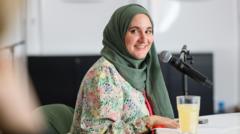‘Raised in a council house, I never saw writing as a career’

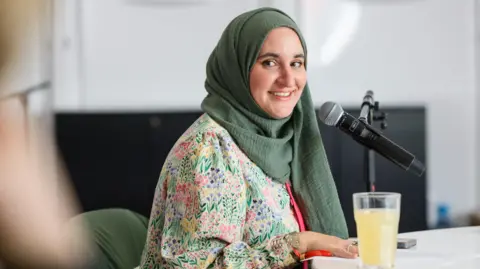 Sam Hardwick/Hay Festival
Sam Hardwick/Hay Festival
Hanan Issa has just surpassed the halfway milestone in her five-year stint as National Poet for Wales.
Growing up, she said she never saw writing as a viable career: “I’m working class, raised in a council house and to me, it wasn’t considered an option.”
But as the 11-day Hay Festival draws to a close on Sunday, she has praised organisers for providing a space for people from marginalised backgrounds in what she said had traditionally been a “very white, middle class space”.
Hay Festival Global describes itself as “the antidote to polarisation”, bringing together “diverse voices to listen, talk, debate and create”, tackling some of the “biggest political, social and environmental challenges of our time”.
After graduating from Cardiff University, where she studied English literature, Hanan felt teaching was her only plausible career but knew it was not for her, having already had some experience in the field.
“I was the first in my family to go to university and so I felt this pressure to have what’s considered ‘a proper job’,” the 39-year-old said.
Hanan went on to work in the voluntary sector, expecting a life-long career in social services.
That was until 2016 when then-prime minister David Cameron said some Muslim women were not integrating into British society and were not learning English.
“[He] spoke so ignorantly… I was like ‘umm, hello! We’re here you know’,” Hanan said.
This was the catalyst that turned Hanan’s writing from personal to public, writing a spoken word piece that she posted online.
Since then, poetry – which she did only for herself or as a gift for loved ones’ birthdays and weddings – has become something she has shared publicly to connect with others.

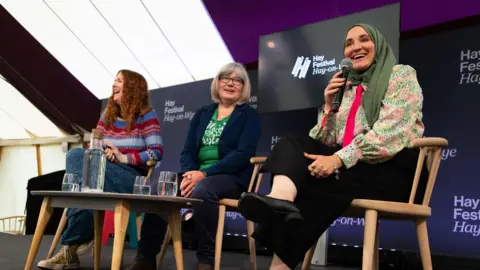 Sam Hardwick/Hay Festival
Sam Hardwick/Hay Festival
Hanan’s first time at Hay Festival in the Powys town of Hay-on-Wye was seven years ago as a selected writer joining the Writers at Work programme, which aims to support emerging Welsh talent.
She described the 10 days of workshops and events as an “eye-opener”, helping to demystify the process of getting published and filling her with confidence as a writer too.
“If it had just been a one-off, I would say that was a tokenistic opportunity. But it hasn’t been. I’ve been asked back time and time again… as a performer onstage,” she said.
Some of Hanan’s highlights of the festival this year included seeing Pulitzer Prize-winning data journalist Mona Chalabi in conversation, as well as Kehinde Andrews, the UK’s first professor of black studies.
Throughout her visit this year, the poet said she noticed “way more hijabis”.
“In a very sort of shallow aesthetic way, for me it’s a natural thing to walk into a space and look around to see what the demographic is,” she said.
“It’s not very often that I look around and see hijabis in literary spaces, put it that way, and it’s been lovely.”
She said children were genuinely excited about writing a poem during one of her on-site events.
“If kids are still excited about books, then there’s hope,” she said.
“There’s hope for that curiosity that we need to drive forward any kinds of progress and kindness in this world.”

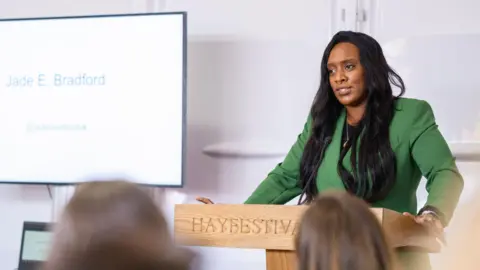 Sam Hardwick/Hay Festival
Sam Hardwick/Hay Festival
For Jade Bradford, from Hertfordshire, it was a life-long dream to attend Hay Festival.
As a communications and engagement manager for a social housing provider in south Wales, writing is Jade’s second job.
After growing up seeing the Guardian’s Hay Festival supplement every year when her dad would buy the paper, this year she was in attendance as a Writer at Work.
“Publishing, it can feel like a closed door sometimes and it’s hard to know who you need to speak to, what it is you actually need, how you get an agent,” the 39-year-old said.
She said if audiences at events like Hay Festival were not representative they may not know their books are not diverse enough, or “that they need to hear other voices”.
Jade added the festival’s efforts in engaging with TikTokers bringing in a younger audience and providing a space for all voices was “really making the difference”.
“I’m seeing younger people, more ethnically diverse people, a lot of really good queer representation happening… and that’s really, really important,” she said.
“We’re seeing a more modern Wales perhaps being represented whilst not losing that classic literary approach.
“We have a really rich national history of literature and there’s nothing wrong with being middle-class, there’s nothing wrong with really literary writing like classic books.
“There’s just a place for all of our different types of writing. That’s the most important thing.”

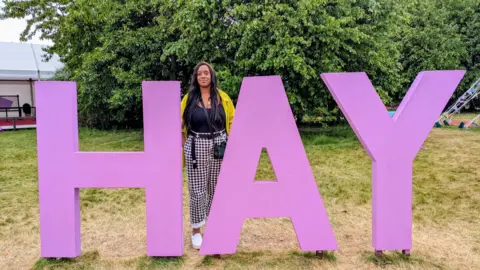 Jade Bradford
Jade Bradford
A highlight of Jade’s week at Hay was going to see curator, writer and broadcaster Ekow Eshun “on a panel of black voices talking about black history”, while another standout was attending a talk with the writer of the film Mr Burton.
She said if someone were to tell her childhood self that she could go somewhere and meet writers, breathe the same air as Jacqueline Wilson and then in the future become a writer herself, “her head would explode”.
This year was also Rhys Thomas’ first time at Hay Festival.
He had a “full circle” moment watching poet John Cooper Clarke take to the stage, after first seeing him while working at his local festival aged 16.
“I just didn’t realise that poetry and literature could have that raw edge to it,” he said.
“He was funny, he was swearing. He’s a rock and roll star who uses poems instead of guitar solos.”
Rhys, a journalist from Laugharne, Carmarthenshire, said it was not until he moved to England for university that he started immersing himself in books and writing.
The 28-year-old described the literary world as “very elite”, and said it could “feel alienating and inaccessible”.
“I didn’t have any books in the house growing up. So I was both sort of economically and culturally not really someone you’d associate with the art world,” he said.
“Over time it has given me a lot of self doubt and confidence issues, especially around like, can I function in the world as a writer? But also in a bigger existential way of, this is a clash against the person I’m supposed to be.”

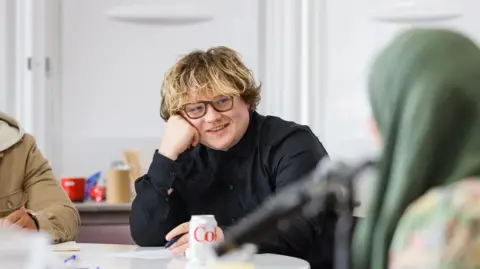 Sam Hardwick/Hay Festival
Sam Hardwick/Hay Festival
Rhys has been writing for a year and a half, and before applying for the competitive Writer at Work programme said he “didn’t believe in himself”.
He said the scheme was “pretty full-on”, with eight hours of activities a day helping to develop writing skills and tailored to all 10 emerging writers on the cohort.
Rhys, who has already filled his 125-page A6 notepad up during the scheme, said he was one of the lucky ones getting to “spend 10 days or so really feeling like we can be in this world, without it breaking our bank accounts”.
“Even at a practical level, it’s given me hope for when I’m scribbling away at the dead of night, it’s not a pointless endeavour,” he added.
Hanan said she has now reached a point in her life “when you feel a space is not inclusive or open to you, you be the one to open that door and wedge a doorstop underneath”.
“If you can, then do it because you opening that door, wedging in that door stop, means that other people can walk through after you,” she added.


